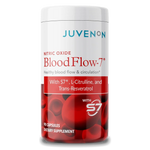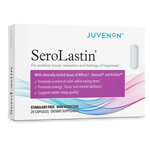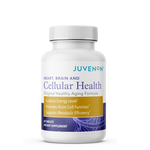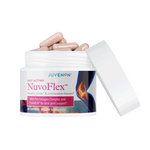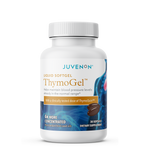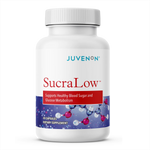
Menopause is something that all women will experience at one point in their lives, and with that come various symptoms.
Before you can address these side effects, it’s important to understand what menopause is, its symptoms and how to recognize the different stages. In this article, we’ll cover the basics of menopause and how you can get through this natural process with as little hassle and discomfort as possible.
What is Menopause?
Menopause is a natural biological process that marks the end of the menstrual cycle. It is typically diagnosed after you have gone 12 months without a menstrual period. When you’ve reached menopause, your ovaries will no longer release eggs or produce estrogen.
But before you reach menopause, you’ll go through the first stage of menopause, called perimenopause.
Defining Perimenopause
With menopause taking center stage during this period in your life, it can be easy to skip over perimenopause. Perimenopause means “around menopause,” and marks the body’s natural transition to menopause.
Irregularities such as shortened or lengthened menstrual cycles, hot flashes, vaginal dryness, and sleep problems are some of the most common symptoms of perimenopause due to the uneven rise and fall of estrogen.
Once you begin to experience perimenopause, your body has officially started moving toward menopause.
When Does Menopause Start?
Everybody’s body is different, and health conditions can affect when you enter menopause, as well as how you experience the symptoms and for how long.
Menopause for most women occurs between the ages of 40 and 50, with the average age in the United States being 51.
Unlike menopause, perimenopause can begin occurring as early as your mid-30s, with most noticeable signs appearing in your 40s.
To easily identify menopause, check for some of the common symptoms, which include hot flashes, night sweats, irregular periods, mood swings, and difficulty sleeping. These symptoms can vary in severity and duration for each individual, but they are all caused by the fluctuation of hormones in the body as it adjusts to the end of menstruation.
In addition to physical symptoms, many women also experience emotional changes during menopause. This can include feeling more irritable or anxious, having trouble concentrating or remembering things, and experiencing a decreased drive. These changes are often attributed to the hormonal shifts happening in the body. It's important to note that not all women will experience every symptom of menopause. Some may have a mild transition, while others may have a more severe one.
Identifying Menopause Symptoms
You’ll be able to tell what effects are irregular to you, and this is an indicator that you’re experiencing menopause symptoms.
These symptoms come in the form of:
- Irregular periods
- Hot flashes
- Vaginal dryness
- Night sweats
- Mood changes
- Sleep problems
- Thinning hair
- Dry skin
- A slowed metabolism
Unsurprisingly, not many women want to deal with the effects of menopause. The symptoms can directly impact everyday life and negatively influence work, personal life, and relationships.
Luckily, there are several ways you can manage these menopause symptoms to get through this natural process in the best way possible.
How To Manage Menopause Symptoms
If you’ve ever heard anyone speak about their menopause experience, there’s hardly ever a pleasant story. These symptoms range from physical to emotional, which can impact mood and overall wellness. It's imperative to manage these symptoms to improve your quality of life, but how?
Here are some of the best and most natural ways to manage menopausal symptoms.
Eat Foods The Right Foods
A balanced diet, while recommended for everyone, is especially beneficial for women dealing with menopause symptoms. Foods high in refined carbs and sugar can cause sharp rises and dips in blood sugar, further worsening the physical and mental side effects of menopause.
With hormones already experiencing high levels of fluctuation, a poor diet can increase the risk of conditions like depression and anxiety in menopausal women.
Foods high in the following nutrients can be a great way to get you motivated and help relieve common menopause symptoms:
- Magnesium
- Calcium
- Iron
- Zinc
- Essential fatty acids
- Vitamins D and B
Additionally, high-protein foods like meat, fish, eggs, legumes, nuts, and dairy products can help prevent muscle loss and help with the weight gain symptoms that come with menopause. It’s important that you refrain from skipping meals, as this can make weight management even more difficult.
Exercise Regularly
Regular exercise can improve your energy and metabolism, lead to better sleep, and decrease stress. Keeping your body healthy can also help protect against other symptoms like weight gain and can help reduce the chances of heart disease, which is an increased risk in menopausal women.
Exercise like walking is enough, but more intense routines like pilates-based exercise programs can help you get the most from the benefits of exercise.
Stay Hydrated
The decrease in estrogen levels you experience during menopause may cause dryness, making hydration crucial. Drinking at least 8 glasses of water per day is recommended, with the ideal number being upward of 12.
Not only will staying hydrated help with dryness, but it can also help reduce the bloating that sometimes comes with hormonal imbalances. Additionally, water can prevent weight gain and slightly increase metabolic functions.
Supplements for Menopause
In addition to maintaining a healthy weight and eating the right foods, supplements for menopause are a great way to manage symptoms.
Natural supplements like phytoestrogens, black cohosh, and red clover can help soothe symptoms like hot flashes.
One of the more popular supplements when it comes to restoring optimal hormonal balance during menopause is Juvenon’s SeroLastin®. This estrogen-free formula can help:
- Maintain a healthy weight
- Improve metabolism
- Regulate mood and curb mood swings
- Reduce stress and sadness
- Boost energy levels
SeroLastin® combines vitamin B6, vitamin B12, Sensoril, enXtra, MagnaFolate® C, and Affron® into an easy-to-take supplement for convenience and effectiveness.
Manage Menopause Symptoms With SeroLastin®
Menopause is high on the list for women entering middle age, but relieving the symptoms that come with it can make it more manageable.
Take control of your menopausal journey with SeroLastin®. One capsule a day is all it takes to help combat perimenopause and menopause symptoms so you can enjoy your days and keep your mind and body in check.


